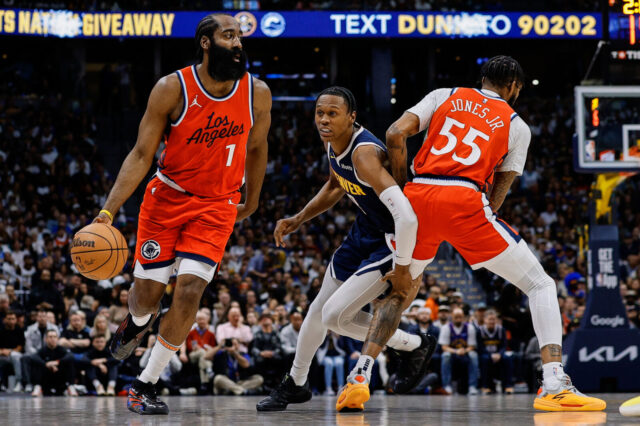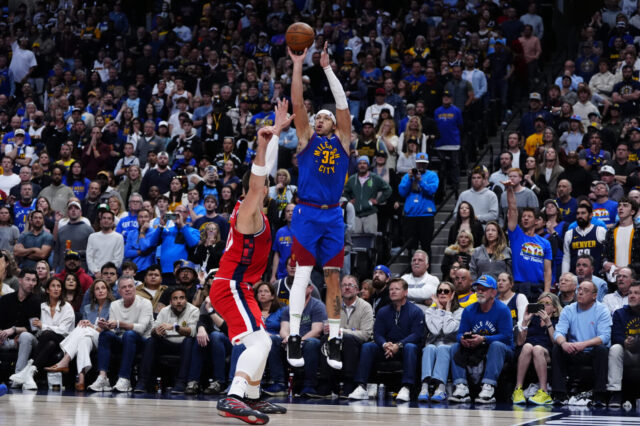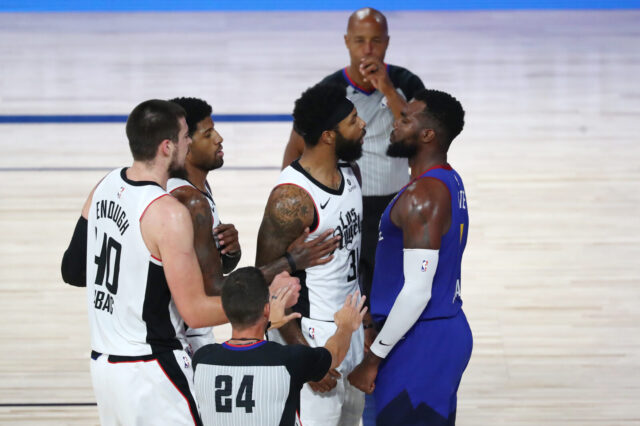I still remember the moment I realized that I wanted to be an NBA writer.
It was four years ago during the summer of 2015, roughly one year after I had written my first blog post. I traveled down to Las Vegas for NBA Summer League where I met many of my favorite NBA writers and twitter personalities while watching horrible basketball played on a high-school sized gym. Up until that point, I didn’t see a career path in NBA writing or podcasting for a 31 year old with no experience or education in journalism. After that week, I knew that I at least wanted to make an honest run at it.
Maybe it was the realization that I could offer a perspective that most NBA analysts lacked. Maybe it was seeing Sacramento Kings owner Vivek Ranadive sporting a pair of virtual reality goggles that got my wheels spinning about how much the sports media landscape was changing, and how ripe it was for new forms of storytelling. Maybe it was just that the NBA was so damn fun and I wanted to waste hours of my days thinking and talking about it.
Maybe it was witnessing the unique brilliance of Nikola Jokic.
Although I had never previously watched a single second of Summer League, it quickly became clear how that venue doesn’t provide the best opportunity to showcase most players. High usage guards and scoring wings stood out. Everyone else blended in. Jokic made his debut with the Denver Nuggets that summer as an unheralded and unheard of 2nd round pick who looked out of shape and lacked the traditional markers for future NBA success.
And yet, after just two games, I couldn’t stop thinking about this flabby, 7-foot Serbian who looked to me a lot like the 2nd coming of Arvydas Sabonis. He only averaged 8 points, 6.4 rebounds, and 1.4 assists over 5 Summer League games but the way he saw the court made me think we were watching a basketball genius trapped in a couch potato's body.
When I returned back to Denver, I sat down to write my first column on Jokic. A few days removed from his last Summer League appearance, I became confronted with the nagging feeling that my opinion on him was deeply biased. I was from Denver, I root for the Nuggets, and here I was convinced that a 2nd round pick was a future star.
In an article that called for Nuggets fans to jump aboard the Nikola Jokic bandwagon, I immediately watered down my takes. I compared him to Marc Gasol…but also to Pero Antic.
In the three years since, that bandwagon has started to fill up. In his sophomore season, Jokic leapt into the top 10 in ESPN’s real plus-minus and became a fixture atop all of the league’s catch-all advanced stats. The Nuggets won 40 games that year and missed out on the NBA playoffs by just one game despite starting three players who were 22 years old or younger.
In Jokic’s third season, he put up an 18-point, 10 rebound, 6 assist per game stat-line that had only been achieved by five other players in NBA history, and he did it while playing over 3 fewer minutes than any of them. But once again, the Nuggets fell a game shy of the playoffs.
This content is no longer available.
This season, Jokic took his game to a whole new level. This time, team success followed. Yet, for some reason, every step along the way there has been a large and vocal contingent of NBA analysts and professional talking heads who have doubted Jokic’s impact on the game.
Two years ago I stopped pushing back on that narrative. After all, I really did have my own bias. But as the Denver Nuggets advanced to the 2nd round of the playoffs on Saturday, after winning 54 games during the regular season and earning the two-seed in the Western Conference despite having the 3rd youngest roster and missing the 3rd most player games due to injury, it’s finally time to push back.
When it comes to Nikola Jokic, we’re all biased.
We’re biased because of his body
There was a chapter in Michael Lewis’s book, The Undoing Project, that explains the Houston Rockets’ pre-draft evaluation of Marc Gasol back in 2007. Then general manager Daryl Morey was aiming to bring draft models and advanced statistical research into his team’s decisions at the draft and their model ranked Gasol extremely high. He could pass, he could shoot, he could defend. He could do it all. There was only one problem: he didn’t look like an NBA player.
This content is no longer available.
“Man Boobs” was the phrase the team’s scouts used to describe him. The nickname became so prevalent internally that it became the preferred phrase they used to describe him whenever he was brought up. Ultimately the Rockets passed on Gasol, who was drafted 48th overall and has gone on to become a 3-time all-star, defensive player of the year, and one of the league’s premiere centers. “Man Boobs” didn’t fit a preconceived notion of what an NBA center is supposed to look like, so 29 teams missed out on one of the best centers of a generation.
We’re biased because he’s European
Nikola once told Sports Illustrated’s Lee Jenkins a story about growing up with his two “crazy” older brothers:
“(They) once held down my arms and threw knives all around my head,” Nikola adds, punishment for refusing to climb a tree during a picnic.”
Jokic’s two older brothers, Strahinja and Nemanja Jokic, are among his closest friends. The older and burlier Strahinja stands about 6’9” tall with fists the size of cement blocks and can often be spotted at Nuggets games cursing out referees or opposing players. Nemanja is only about 6’7” and has spent the last few years training to become a Muay Thai fighter. According to Nikola, they both “look like serial killers.”
He’s not wrong. Would you want to mess with them?
Even as a professional basketball player, Jokic would tell stories of full-blown wrestling matches between the brothers inside of their downtown apartment. One day in particular, Nikola bragged to the local media that he had submitted Nemanja, forcing him to tap out after locking him in a painful hold.
Most American-born NBA fans couldn’t even locate Serbia on a map, let alone tell you a single detail about the country’s history, culture, or population but that won’t prevent many Jokic doubters from labeling Jokic as soft. Soft is a buzzword, one that carries with it many stereotypes and prejudices (most of which are far dicier than I care to explore in this column). But there’s a prevailing xenophobia and ignorance among NBA fans when it comes to European players that paints them all with the same broad brush.
We’re biased because he was drafted in the 2nd round
Anchoring bias occurs when the first piece of information you receive sets expectations and alters the lens through which you understand whatever happens subsequently. This is why throughout their rookie seasons, most fans thought it was completely absurd to think Jokic was better than Jahlil Okafor, despite the fact that Jokic outperformed Okafor in every advanced statistical measure while also grabbing more rebounds, assists, and steals in nearly half the minutes.
This content is no longer available.
Okafor might’ve been disappointing for the third overall pick but that only meant he had fallen from an already high perch. Jokic started from the bottom, so while he out-performed expectations, he had a long way to rise to catch-up to a player like Okafor. Three years have passed since then but those anchoring points still tether our expectations.
We’re biased because we’ve been told there’s only one personality type for winners
The most basic and reductive understanding of the “mamba mentality” doctrine is that only the most focused, vicious, dedicated, and obsessive competitors can achieve success. There is more or less a single, unified way of being a true superstar that leads to greatness, and that way is mostly void of anything but drive and determination. Kobe Bryant had it. Michael Jordan had it. And that is that.
A decade removed from Kobe’s reign and the league is littered with toxic mambalitity. There’s no shortage of players trying to appeal to the ideals Kobe has equated with success. Publicly challenging or even chastising teammates is a virtue. So too is a willingness to take every important shot, even at the expense of logic or reason.
But mamba mentality seems to gloss over an overwhelmingly large portion of NBA history. Jordan and Kobe are two of the greatest winners in league history but they weren’t the only winners. There was the calm thoughtfulness of Kareem Abdul Jabbar, the joyful creativity of Magic Johnson, and the quiet leadership of Tim Duncan, among countless others.
“Joker” probably lacks mamba mentality, at least the most common interpretation of it. Like LeBron James, Jokic seems hardwired to make the “right” play rather than the heroic one. Like Magic, he thrives on freedom, creativity, and fun. It doesn’t mean that he lacks competitiveness, or drive, or determination. But his energy often seems to come from a place of joy, not from anger. In the shadow of the Kobe doctrine, that joy is often viewed as weakness.
We’re biased because the league does a poor job promoting certain markets
Did you know that Jokic leads all players in the first round of the NBA playoffs in defensive box plus-minus? Or that he fell just one assist shy of averaging a triple-double in his playoff series debut? Or that in game 6 he set a Denver Nuggets playoff record for points? You might’ve missed it as the Nuggets and San Antonio Spurs series is this year’s honorary “NBA TV series.” Every year a pair of first round playoff series are thrown down to the bowels of your local cable package while the rest of the league is promoted as marquee events.
The same is true of the regular season, where teams like the Nuggets just don’t get national TV exposure, especially sharing a west coast time slot with the much more popular Golden State Warriors and Los Angeles Lakers. In the same way that Facebook newsfeeds create biases, so too does the NBA newsfeed. Analysts are low on Jokic because the only times they watched him play were a couple of random Thursday nights in February when the Nuggets lost to the Rockets and Warriors by a combined 41 points.
We’re biased because it’s very difficult and painful to admit when we are wrong
The Nuggets won tonight and will advance to the 2nd round and everyone’s predictions heading into the series were wrong. But admitting that Jokic might actually be what all evidence points toward him being – one of the league’s best players – would take a level of painful self-reflection that most humans aren’t capable of. Instead, they will do what every conman and smooth talker does when their predictions about the future are proven wrong: move the goal posts.
“Yes, Jokic is a fake superstar…his triple-double average in his NBA playoff debut was misleading.”
“Yes, I said that he will get exposed in the playoffs…but I meant later on in the playoffs.”
Or the Skip Bayless special of setting the bar so enormously high that it almost certainly won’t be cleared:
“Yes he was good in this series…but he’ll never win a championship as the best player on his team.”
We’re biased because Jokic is something entirely new
Perhaps my favorite thing about the game of basketball is that, like most things in life, it is a living, evolving organism. It doesn’t take a historian to watch the 1968 Celtics and realize that the game has changed. Hell, even watching the 2009 Lakers feels like watching an entirely different league with an entirely different set of rules.
And yet, when analyzing players, we often rely so heavily on established points of reference. Sure Jokic can pass and handle the ball like some of the most elite guards in the league, but can he block shots like Hakeem Olajuwon? Can he dunk like Shaquille O’Neal? Or even simply…jump?
Jokic grades poorly when you grade him based on form, but he grades highly when you grade him based on function. And the best, most unbiased basketball analysis relies on the latter much more than the former.
None of this will change now that Jokic and the Nuggets are advancing into the 2nd round. The goal posts will move, the narrative will take on a new form, and the most likely outcome is that at some point or another, Jokic’s team will fail. Jokic will be whatever he makes himself, but his skeptics will perceive him to be what they’ve already decided he is.
The game exists for fans to have something fun and interesting to talk about, even when those conversations take the form of irrational and fiery debates. In that way, everything is fair in basketball fanhood. Many successful analysts have made an entire career out of painting themselves into a corner and defending their takes against all logic and evidence so if a person’s opinion of Jokic won’t change after this series, it probably never will.
Just remember that when it comes to Nikola Jokic, we’re all biased.


